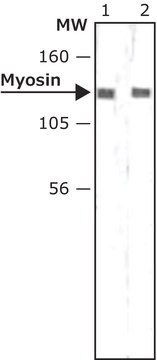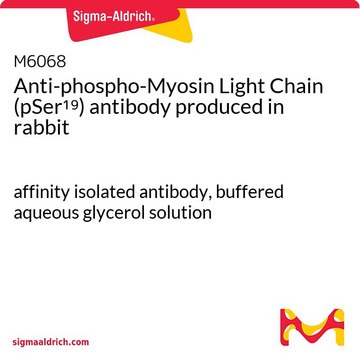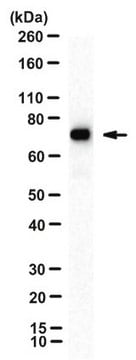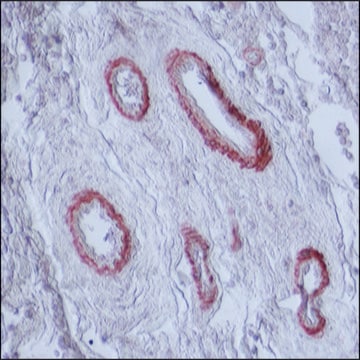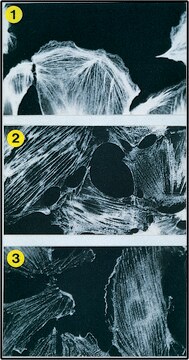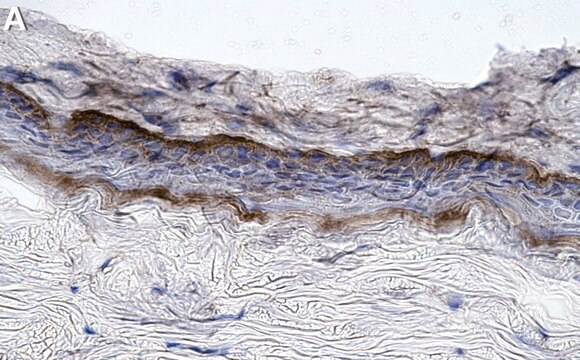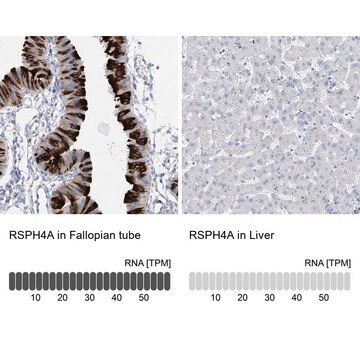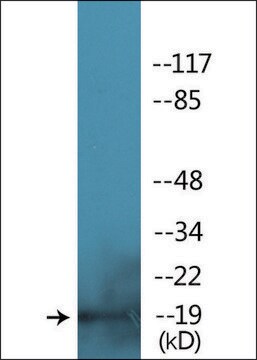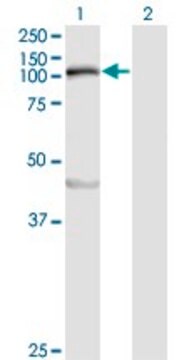ZMS1139
Anti-MLC-2/MYL2 Antibody, clone 19D3.1 ZooMAb® Mouse Monoclonal

recombinant, expressed in HEK 293 cells
Sinonimo/i:
Cardiac myosin light chain 2, MLC-2s/v, MLC-2v, Myosin light chain 2, slow skeletal/ventricular muscle isoform, Myosin regulatory light chain 2, ventricular/cardiac muscle isoform, Ventricular myosin light chain 2
About This Item
Prodotti consigliati
Origine biologica
mouse
Livello qualitativo
Ricombinante
expressed in HEK 293 cells
Coniugato
unconjugated
Forma dell’anticorpo
purified antibody
Tipo di anticorpo
primary antibodies
Clone
19D3.1, recombinant monoclonal
Descrizione
recombinant, expressed in HEK 293 cells
Nome Commerciale
ZooMAb® learn more
Forma fisica
lyophilized
PM
calculated mol wt 18.79 kDa
observed mol wt ~18 kDa
Purificato mediante
using protein G
Reattività contro le specie
mouse, human, rat
Confezionamento
antibody small pack of 25 μL
Caratteristiche più verdi
Waste Prevention
Designing Safer Chemicals
Design for Energy Efficiency
Learn more about the Principles of Green Chemistry.
Convalida avanzata
recombinant expression
Learn more about Antibody Enhanced Validation
tecniche
immunofluorescence: suitable
immunohistochemistry: suitable
western blot: suitable
Isotipo
IgG1κ
Sequenza dell’epitopo
Unknown
N° accesso ID proteina
N° accesso UniProt
Categoria alternativa più verde
Condizioni di spedizione
ambient
Temperatura di conservazione
2-8°C
Informazioni sul gene
human ... MYL2(4633)
Descrizione generale
Specificità
Immunogeno
Applicazioni
Evaluated by Western Blotting in C2C12 cell lysate.
Western Blotting Analysis: A 1:1,000 dilution of this antibody detected MLC-2/MYL2 in C2C12 cell lysate.
Tested Applications
Western Blotting Analysis: A 1:10,000 and 1:1,000 dilution from a representative lot detected MLC-2/MYL2 in lysates from Human skeletal muscle and L6 cells, respectively
Immunofluorescence Analysis: A 1:1,000 dilution from a representative lot detected MLC-2/MYL2 in human heart tissue sections.
Immunohistochemistry (Paraffin) Analysis: A 1:1,000 dilution from a representative lot detected MLC-2/MYL2 in human heart and rat heart tissue sections.
Note: Actual optimal working dilutions must be determined by end user as specimens, and experimental conditions may vary with the end user.
Descrizione del bersaglio
Stato fisico
Ricostituzione
Stoccaggio e stabilità
Altre note
Note legali
Esclusione di responsabilità
Non trovi il prodotto giusto?
Prova il nostro Motore di ricerca dei prodotti.
Codice della classe di stoccaggio
11 - Combustible Solids
Classe di pericolosità dell'acqua (WGK)
WGK 1
Punto d’infiammabilità (°F)
Not applicable
Punto d’infiammabilità (°C)
Not applicable
Certificati d'analisi (COA)
Cerca il Certificati d'analisi (COA) digitando il numero di lotto/batch corrispondente. I numeri di lotto o di batch sono stampati sull'etichetta dei prodotti dopo la parola ‘Lotto’ o ‘Batch’.
Possiedi già questo prodotto?
I documenti relativi ai prodotti acquistati recentemente sono disponibili nell’Archivio dei documenti.
Il team dei nostri ricercatori vanta grande esperienza in tutte le aree della ricerca quali Life Science, scienza dei materiali, sintesi chimica, cromatografia, discipline analitiche, ecc..
Contatta l'Assistenza Tecnica.